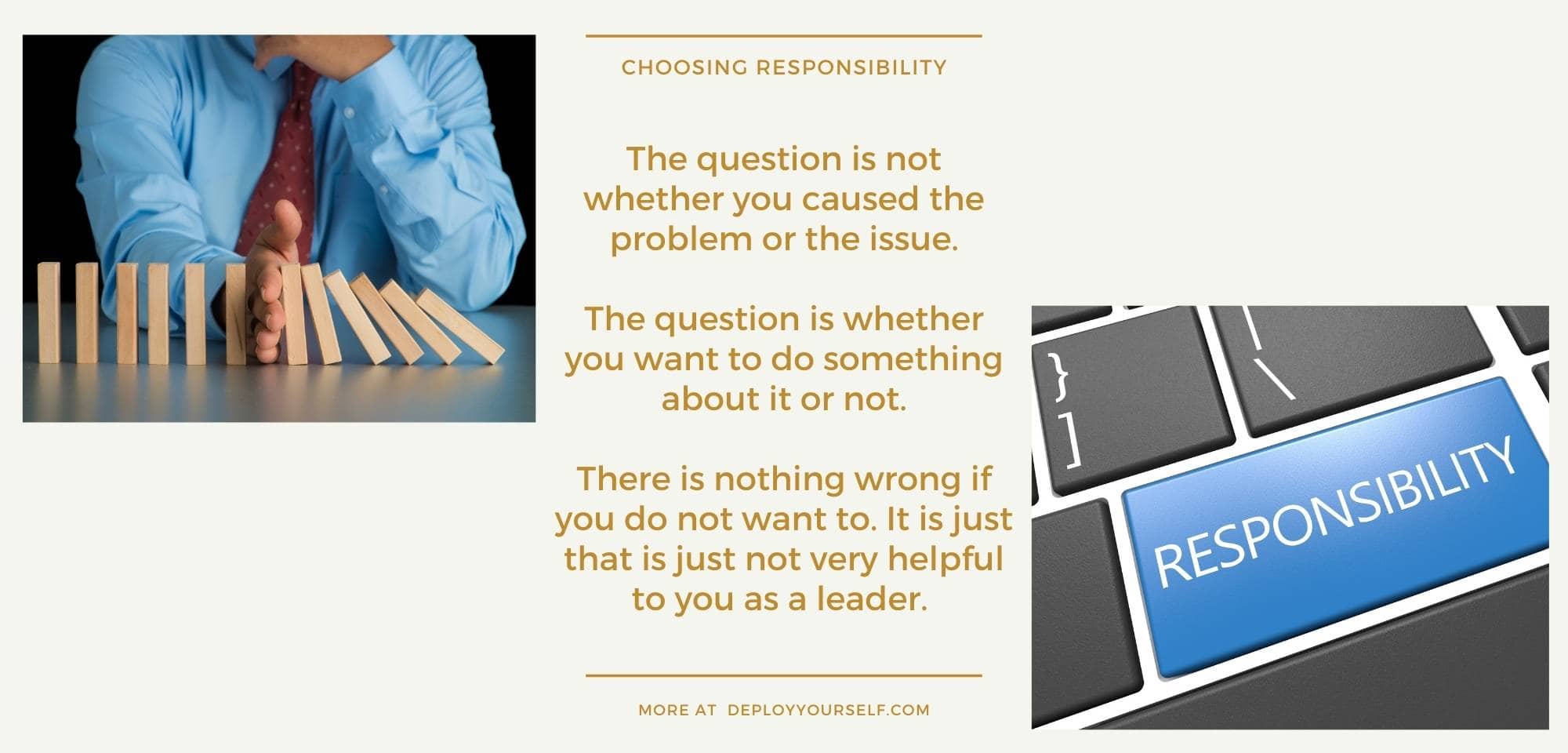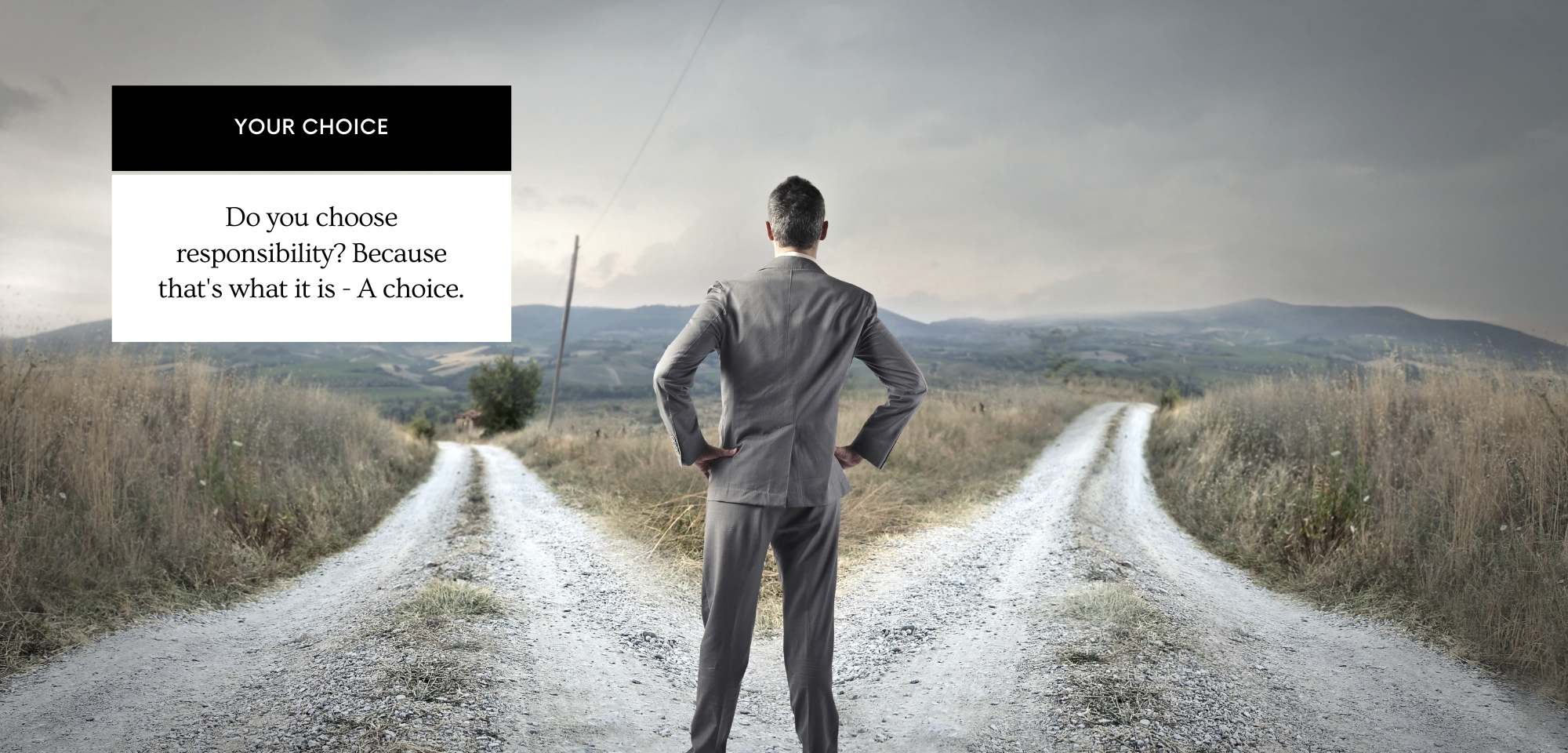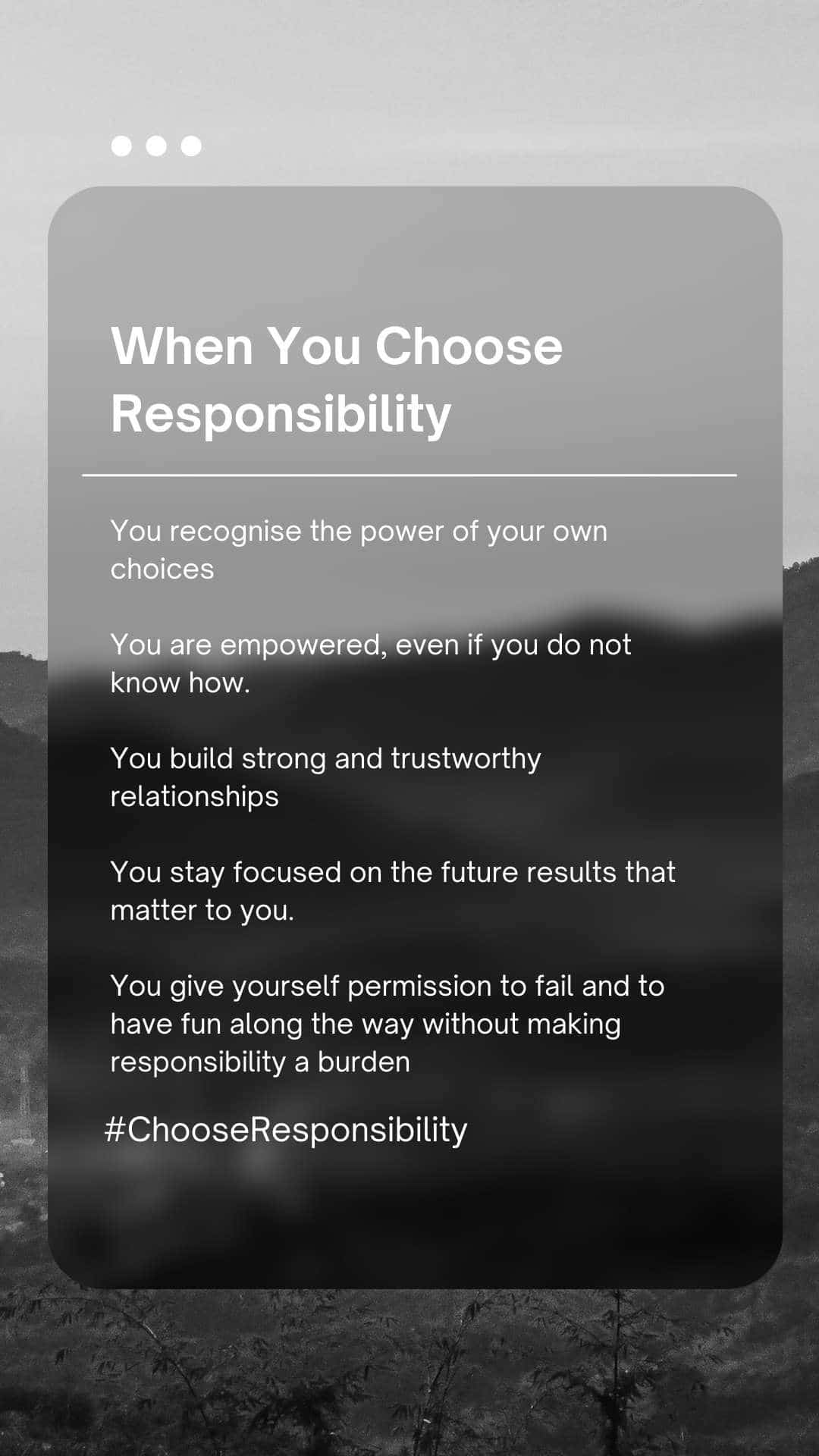“Politicians are of no use.”
“Bureaucrats just slow everyone down.”
“The new CEO is no good. Look at what he did in his previous company.”
While the above sentences don’t directly mention “responsibility”, all of them are blaming people for not taking responsibility for what they are accountable for. These kinds of statements are all too common in the world we live in today.
Most people talk about “responsibility” lightly, and it is thrown around in random conversations. It can cause a lot of blame, grudges, and grievances because someone else has not been “responsible”. Yet, when it comes to ourselves and our own responsibilities, we rarely stop to think about what “responsibility” means, what it demands from us, and what is the price of accepting responsibility or not.
In this article, I want to share my thoughts about what accepting responsibility means, and how accountability and responsibility are different – especially for leaders.
Years ago, I was approached by a colleague who wanted my help in setting up an alumni program for the company we were working for. Here is how the conversation went:-
I – “Why do you want to set up this program?”
He – “Because there is no such program for our alumni currently.”
I – “Has management given you this task to create such a program?”
He – “No, they haven’t. I hope to convince them soon though.”
I – “If the management is not interested, then why are you making this up?”
He – “I just told you – for our alumni to have a way to connect, support and help each other in the future.”
I – “If you are not responsible for this project, then why do you want to pick up this additional burden?”
He – “I have benefited from alumni networks of my previous companies. And it sucks when I see that we don’t have one. I am not accountable for creating this network, but I choose responsibility for it because this matters to me. It is not a burden, it is a choice and a privilege.”
What Is Accountability?
The above conversation led me to distinguish responsibility from accountability – which I have seen is confusing for most people. Accountability is simply being answerable for certain results which you have committed/promised to produce. Responsibility, on the other hand, is a choice. You can take (or choose) responsibility even without any agreement or promise.
Let me elaborate. When you take on a role or make an agreement, you are accountable for certain results and outcomes. For example – If you become a team leader at work, then you are accountable for all results the team produces, as well as other intangibles like culture, relationships, etc which impact and influence those results.
You can be accountable for something without accepting responsibility for it. I often meet people who are accountable for their team and its results, and yet they refuse to take full responsibility for it. They continue to blame others and act like a victim despite having made an explicit commitment towards producing those results.

What is Responsibility?
Responsibility is our ability to respond to any given situation. And we always have this ability, though whether to use it or not remains our choice. To be responsible means to acknowledge that you are responsible “not” for the situation you find yourselves in, but for acting in the face of the situation.
Responsibility doesn’t mean you are “responsible” for all the situations, circumstances, and challenges in your life. However, it does mean that you choose to fix the situation and move in the direction of your desired results.
Embracing responsibility will demand a shift in behaviour compared to the normal way of doing things. When you understand what accepting responsibility means, you can’t make excuses or play the victim. Instead, it demands that you stand up and do whatever is needed to produce the results you have taken responsibility for.
Responsibility Is A Privilege And A Choice
Responsibility means looking at your contribution to the problem. Why do you have to do that? Well, you don’t. If you don’t want to. That is why I want to repeat that responsibility is a choice, and it is perfectly ok to not choose responsibility in a given situation. There is nothing wrong with not choosing responsibility. It is just not effective for leadership and producing results.
However, acknowledging that responsibility is a choice gives you the freedom and power to move forward despite the circumstances of your life. If I pick up my phone and drop it, it will fall on the ground. Why did the phone fell? Did it fell because of “gravity”? Or did it fell because I dropped it?
Both the above reasons are true. Taking responsibility is to choose the second answer. The phone fell because I dropped it. Yes, there is gravity, and it would not be wrong to say that the phone fell because of gravity. But at the same time, it would not be very powerful when it comes to taking action and doing something about it.
Acknowledging that the phone fell because you dropped it gives you the power to do something about it. That is what I mean by looking at your contribution to the problem. How did you contribute to the situation you find yourselves in? What could you have done earlier to prevent the situation? What could you do now to move towards creating the result you want to create?
While this may seem like a burden, responsibility is a privilege. It is not taking or accepting the “blame” for the situation. You are not responsible for the circumstances or situation you find yourself in. However, you can choose responsibility in the face of your circumstances.
“Do what you can, with what you have, where you are.” ― Theodore Roosevelt
Responsibility is Results Oriented
You take responsibility to produce the results that matter to you. Not to look good or to prove you are a good leader. Not because it is the right or fair thing to do. Responsibility is always oriented towards a particular result you want to produce in the future. You choose responsibility because it will help you and your teams move toward that result. As simple as that.
In any given situation, we can choose what actions to take so that it moves us forward towards our desired results. Or we can choose those actions which come easily to us or are more comfortable to us and our peers. Responsibility is about accepting that you always have the choice to choose your actions. Responsibility allows you to do something to solve the problem.
Choosing responsibility doesn’t mean that you have to have all the answers. You do not have to know the entire way to the results you desire. Responsibility includes acknowledging uncertainty and finding the way to where you want to do. Responsibility means starting on a journey even when you don’t know the complete route to your destination.
Choosing responsibility also doesn’t mean that you become “heroic” and can now trump any challenge. Responsibility includes acknowledging your humanness and limitations. It includes asking for help when required, seeking an apology when you make a mistake, and renegotiating a previous commitment that you know will not be kept.

Responsibility is Always Unconditional (You Can’t Play Victim)
“Did you see what he just did? He just messed up the whole assembly line.”
“Let us help him identify his error and prevent production and supply chain problems down the line.”
“Wait. Why do you want to do that? We are not responsible for that. He messed it up. Let him pay the price.”
“It’s not about who is responsible. It is about who suffers in the future. If the production is delayed, then our customers suffer. Our company will suffer, and as a result, all of us (employees) will suffer. We must take action to avoid future problems.”
“But we didn’t cause the problem. It is not our fault.”
“You are right. And doing something about it doesn’t mean accepting responsibility for causing the problem. It just means that we do what is necessary now to create the results that we say we want in the future – which in this case is on-time delivery to our customers to keep our commitments.”
It is so easy to go into blame when things don’t go as expected or planned. Blame is part of the culture in many workplaces. When things go wrong, fingers are pointed as people look to escape responsibility (often subconsciously). Unfortunately, this could destroy opportunities for individual and team learning, growth, and success. However, if you accept responsibility, you can’t play the victim anymore.
It is important to clarify that accepting responsibility doesn’t mean you go on to blame yourself instead. No blame means you do not get to blame somebody else (your manager, wife, friend, colleague), something else (your company, traffic, circumstances), or yourself.
This means that when mistakes and setbacks happen, you have to take ownership of the results produced and not produced instead of passing the buck. Taking responsibility will put you on a path of problem-solving rather than an endless game of blame and guilt that offers no solutions. It will require you to identify what you can do now.
Pointing fingers rarely solves anything. The energy you waste by blaming others is better spent on finding solutions. When a leader plays the victim card, they risk being marginalized and ignored. Blame also leads to mistrust in the team. People don’t feel safe and have to constantly watch over their shoulders.
When you distance yourself by claiming that the situation was out of your control or it is not your job, you miss out on the opportunity to exercise your choice. You relinquish your power as a leader. There is no time for excuses when you choose responsibility as you would instead be looking for what to do next. Each time you take responsibility, you become better at exercising choice (to focus on the future and not the past) and inspire the rest of your team to do the same.
The Opposite of Responsibility – Blame and Judgement
Every time you blame others, you refuse to acknowledge your contribution to the problem. Blaming and judging others incentivizes people to deny ownership and inhibits learning and growth. The opposite of responsibility is not irresponsibility or indifference. The opposite of responsibility is accusing and blaming something else, someone else, or yourself.
Like a drug, blame only gives you temporary relief and then leaves you in a state of righteousness and inaction. It fails to address the problem from a long-term perspective and can even exacerbate the situation. In the worst-case scenario, it prevents the team from performing by creating distrust. Blame focuses on only the symptoms while it ignores the deep underlying problems.
Blame looks to simplify the situation by finding someone or something to blame when the reality of human interaction is much more complex and everyone plays a part in whatever failure or success a team achieves or not. Taking responsibility discourages the culture of blame and judgment and promotes introspection, growth, and learning.
Blame pulls people apart while taking responsibility brings them together. You not only boost your immediate performance but also contribute to improving your organization’s long-term health.
You Are A Bystander or A Victim When You Do Not Take Responsibility
If you do not choose responsibility then you are either a bystander or a victim. For example – If I am worried about climate change but decide not to take responsibility to make things better, then I am a bystander. Nobody is going to hold me accountable for climate change (as I have no official accountability for it).
However, if I have official accountability for managing climate change due to my position, for example, as a head of a state, then I become a victim if I do not choose responsibility for climate change. In an official role, people will hold me accountable for the results I have committed to or they expect me to deliver. The only choice I have is whether to choose responsibility or not. If I do not choose responsibility, I automatically become a victim.
Responsibility Requires You To Focus on the Future At All Times
After surveying thousands of people on the subject of leadership qualities, Barry Posner and Jim Kouzes found that forward-thinking is the most admired trait in leaders after honesty. Being responsible means focusing on the future and what you can do in the present moment to move your team/company towards the future you aspire.
Mistakes and setbacks are part of work-life and will happen along the way, but dwelling on the past distracts from the only thing you can impact – the present moment. Instead of wasting time and energy assigning blame, concentrate on learning from the mistakes and do what you can do to offer solutions to ensure the mistake doesn’t happen again.
Being responsible demands you to focus on the future and not endlessly stay stuck in thinking about what happened in the past – whether it was 5 minutes ago or 5 years ago. The past has a way of holding you back when you dwell on it for too long.
As Soren Kierkegaard once said, “Life can only be understood backwards, but it must be lived forwards.”
Thinking about the future we want to create, and exploring ways to get there together with the team saves time that would have otherwise been lost blaming yourself or others. It also helps prevent similar problems in the future.
Where are we going? How will we get there? What do we need to do to move from point A to point B, given the state we are in currently? These are some of the questions you should ask yourself if you want to choose responsibility.

You Can Choose To Be Responsible For More Than What You Are Accountable For
You can always take responsibility for your team, department, or company even if you are just an individual contributor. Every team is bound to experience challenges along the journey. For example, when individuals with varying viewpoints, skills and knowledge come together, conflict is inevitable.
As a team member, you are not accountable for the entire team’s performance. That is the team leader’s accountability. But you can always choose that responsibility and act in the interest of the entire team. If you do that (and take care to not step on others’ feet while doing so), you will soon find yourself in the job you voluntarily choose to be responsible for.
Ask yourself – Where are you resigned or disempowered in your life? Where do you feel emotions like frustration, apathy, or a lack of engagement in your life? Whenever I ask myself this question, I find out that I am not taking responsibility where I feel a lack of energy or empowerment.
Ask yourself the above questions and see what emerges? Are you not taking responsibility in areas where you feel disempowered? What could be some alternate choices in those areas that could allow you to move towards the future, no matter how unlikely or difficult that might be? Responsibility is not having all the answers to fix what you face. It is about taking the next action that you can take in that direction.
“Everything can be taken from a man but one thing: the last of the human freedoms—to choose one’s attitude in any given set of circumstances, to choose one’s own way.” ― Viktor E. Frankl
Final Thoughts
There will always be friction, no matter what you are trying to achieve. But it can either grind you down or give you energy. When you choose to be responsible, friction will never demotivate you. Instead, it will encourage you to learn, grow and set a high bar for yourself as well as for others around you.
Accepting responsibility for our actions is a choice. It often leads to joy, satisfaction, pride, and peace regardless of the outcome. When things are going as planned, you will be more satisfied knowing that your hard work had a role to play in it. Also, when things don’t work as expected, you will accept what is so, learn from the mistakes, and continue on the journey.

Trackbacks/Pingbacks